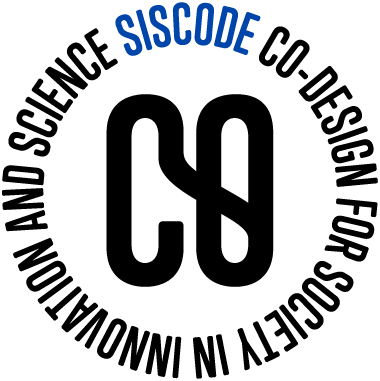SISCODE - Co-Design for society in innovation and science
Research area Innovation and education in the digital society | PD Dr. Christoph Kaletka | Dr. Jennifer Eckhardt | Daniel Krüger | Jens Maylandt | Ann Christin Schulz | Eva Wascher | Beata Lewandowska
SISCODE aims at stimulating the use of co-creation in policy design, using bottom-design-driven methodologies to pollinate Responsible Research and Innovation (RRI), and Science Technology and Innovation (STI) Policies.

European Commission, Horizon 2020 Innovation and Research Program
In the last century, Public Engagement (PE) and Responsible Research and Innovation (RRI) have emerged as a result of policy directives and initiatives that call for early involvement of a wide range of stakeholders. Nevertheless, early stakeholder engagement faces many challenges, and PE rarely goes beyond the consultation stage. On the other hand, the integration of co-creation in European STI policy frameworks and programs faces barriers such as: a lack of understanding of co-creation among scientists and policy makers; a "sectoralized" approach to STI policy making; and insufficient knowledge to deal with constraints that inhibit the co-creation process. The introduction of design methods and tools help to deal with these problems, as design has already been identified as a key to operationalize co-creation in different fields. Thanks to an iterative process, focused on prototyping, co-design efficiently supports co-creation in the development of new solutions and policies up to implementation.
Against this background, SISCODE aims to better understand co-creation as a bottom-up and design-driven phenomenon currently flourishing in Europe, to analyze the beneficial conditions that support scalability and replication, and to use this knowledge to mutually link RRI practices and policies.
This task will be conducted along three operational objectives:
- A Europe-wide study of existing local, regional, national, and European ecosystems and co-creation dynamics will be conducted in order to use the results to describe actionable integration of society in science and innovation. The study analyzes and compares: the different cultural, organizational, institutional and regulatory conditions under which co-creation thrives; the diversity among actors and stakeholders (gender, culture, education and backgrounds) that foster co-creation; the typologies of challenges and citizens affected by them (including disadvantaged groups, women, children, migrants, etc.); and the characteristics of co-produced solutions;
- Further, to experiment with design as a new skill system, building capacity for actionable co-creation processes in RRI and STI policy-making;
- And to embed co-creation as a design-led approach in RRI processes and STI policy designs, the cultural, organizational, and procedural transformations need to be understood, overcoming barriers and resistance to change.
- POLITECNICO DI MILANO - Italy (Coordination)
- AGENZIA PER LA PROMOZIONE DELLA RICERCA EUROPEA - Italy
- TU DORTMUND - Germany
- ASSOCIATION EUROPEENNE DES EXPOSITIONS SCIENTIFIQUES TECHNIQUES ET INDUSTRIELLES - Belgium
- STICHTING MUSEUM VOOR INDUSTRIE EN SAMENLEVING - Netherlands
- SOCIEDADE PORTUGUESA DE INOVACAO - CONSULTADORIA EMPRESARIAL E FOMENTO DA INOVACAO S.A. - Portugal
- INSTITUT D'ARQUITECTURA AVANCADA DE CATALUNYA - Spain
- CIENCIA VIVA-AGENCIA NACIONAL PARA A CULTURA CIENTIFICA E TECNOLOGICA - Portugal
- ASSOCIATION TRACES THEORIES ET REFLEXIONS SUR L APPRENDRE LA COMMUNICATION ET LEDUCATION SCIENTIFIQUES - France
- ARISTOTELIO PANEPISTIMIO THESSALONIKIS - Greece
- UNIVERSITY COLLEGE LONDON - United Kingdom
- BIOSENSE INSTITUTE - RESEARCH AND DEVELOPMENT INSTITUTE FOR INFORMATIONTECHNOLOGIES IN BIOSYSTEMS - Serbia
- THE PROVOST, FELLOWS, FOUNDATION SCHOLARS & THE OTHER MEMBERS OF BOARD OF THE COLLEGE OF THE HOLY & UNDIVIDED TRINITY OF QUEEN ELIZABETH NEAR DUBLIN - Ireland
- KRAKOWSKI PARK TECHNOLOGICZNY SP ZOO - Poland
- DANSK DESIGN CENTER - Denmark
- Foreningen Maker - Denmark
- EUROPEAN NETWORK OF LIVING LABS - Belgium
SISCODE aims to promote the use of collaborative problem-solving processes ("co-creation") in policy-making and in the field of Responsible Research and Innovation (RRI). To this end, bottom-up designed methodologies are developed and used to link these practices to the areas of responsible research and innovation and science and technology innovation policy ("Science, Technology and Innovation" (STI)).
The project is conceived as a linkage of more or less decoupled topics. Therefore, the focus is on (re)building missing linkages between strategic tasks (to make research and innovation more "accountable"), issues and communities (fields of science and technology, stakeholders, citizens and society at large), and basic research and innovation activities. The project will then draw results from past and present experiences in public participation for STI policymaking and from experiments and action research to expand knowledge and practical recommendations to assure that research and innovation outcomes are more beneficial to society.
Against this background, the focus of the project is to investigate in detail diverse individual initiatives and policy frameworks in different European contexts in order to understand as a result what forms of co-creation are being implemented in research and innovation, and to be able to integrate this knowledge into the design of future solution developments and policy guidelines.
This Investigation will combine two complementary processes:
- A multi-faceted analysis and interpretation of different cases in Europe. This includes a mixed-methods approach and triangulation of quantitative and qualitative research findings. This will create the opportunity to identify and further investigate the success models of co-creation in STI. From this, the most effective approaches, practices, and tools will be drawn.
- A pilot test investigating 10 co-creation initiatives (SISCODE Co-Creation Labs). The European SISCODE Co-Creation Labs are located in the three networks of Living Labs, Fab Labs and Science Centers/Museums. The SISCODE Co-Creation Labs will test and evaluate the above co-creation approaches, processes and tools.
By pooling these results, SISCODE will derive recommendations for policy makers to make future innovation policy more inclusive. In the inclusion of societal actors in science and innovation, care should be taken to know and consider the conditions of enabling and inhibiting factors in the context of "actionable inclusion." This refers not only to drivers, but also to relevant barriers, such as unwillingness to change, lack of resources, knowledge, established practices and tools.




![[Translate to English:] [Translate to English:]](/storages/zentraler_bilderpool/_processed_/a/f/csm_Kontakt_b86e8d8ecc.png)
![[Translate to English:] [Translate to English:]](/storages/sfs-sowi/_processed_/6/c/csm_Glasfront_sfs_Header_eae6d325d3.jpg)
